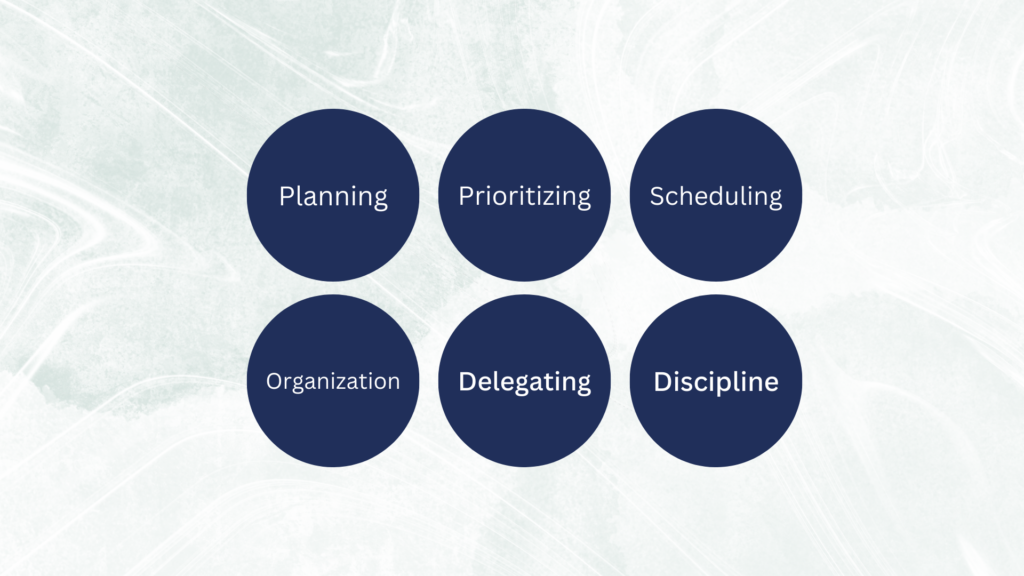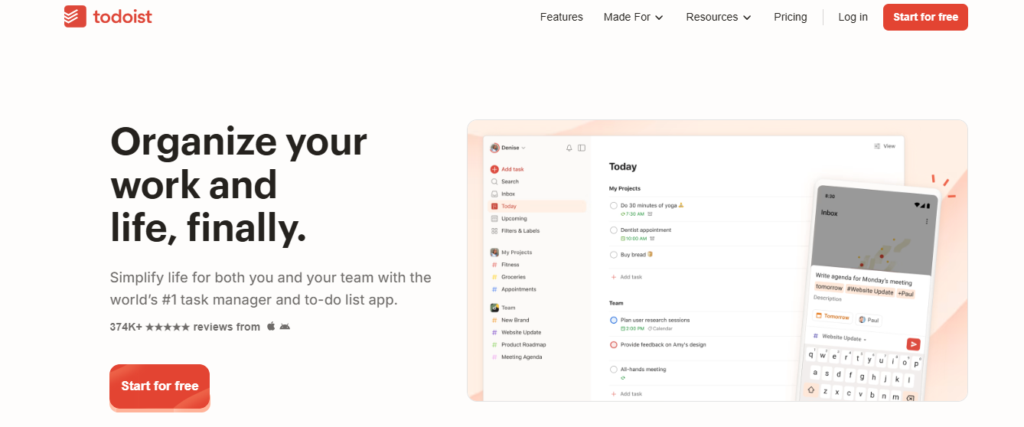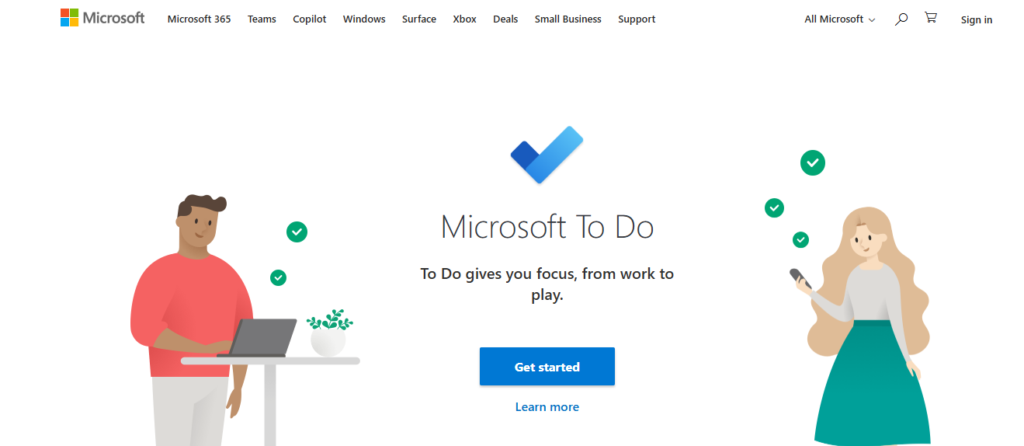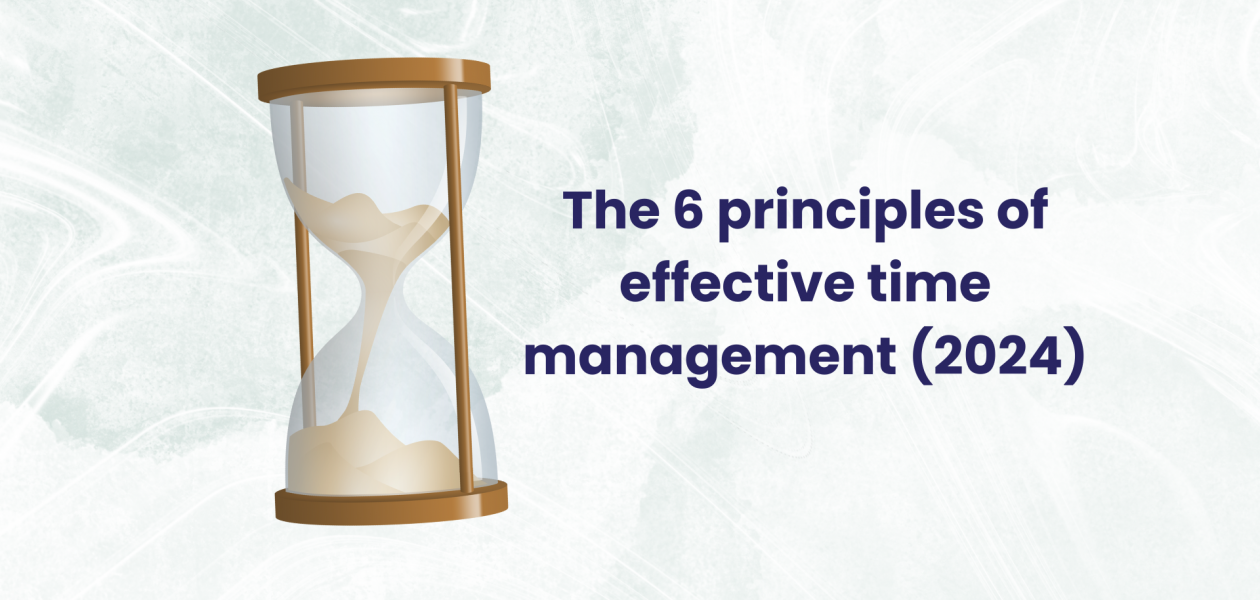In today’s fast-paced world, time is a precious commodity. How we manage it can significantly impact our productivity, efficiency, and overall success. Revolution Learning and Development Ltd has outlined six essential principles of effective time management that serve as a roadmap to help individuals harness their time wisely. Let’s delve into each principle and explore how they can be applied to optimize our daily routines.
What is principles of effective time management
Effective time management principles involve planning tasks, prioritizing them based on importance and urgency, scheduling specific time slots for execution, organizing resources and workflows efficiently, delegating tasks when necessary, and maintaining discipline by adhering to schedules and commitments consistently.
By implementing these principles, individuals can optimize their productivity, minimize distractions, and achieve their goals effectively within the available time frame.
Best 6 principles of effective time management

Planning
At the core of effective time management lies planning. This initial step involves capturing all tasks and commitments, whether through to-do lists, planner templates, or digital tools like Trello. Breaking down complex tasks into smaller, manageable chunks facilitates better organization and execution. By having a clear roadmap of what needs to be done, individuals can avoid feeling overwhelmed and focus on moving forward systematically.
Prioritizing
Once tasks are identified, the next crucial step is prioritization. Understanding the importance and urgency of each task enables individuals to allocate their time and resources effectively. Tools like the Eisenhower Matrix or the ABCDE Prioritization Method can aid in determining which tasks deserve immediate attention and which can be deferred. By prioritizing tasks based on their significance and impact, individuals can ensure that they are directing their efforts towards activities that align with their goals and objectives.
Scheduling
While planning lays out the groundwork, scheduling is about committing time to execute those plans. It involves allocating specific time slots for tasks and blocking out distractions. Whether using online calendars, planners, or spreadsheets, scheduling helps individuals allocate their time effectively and ensures that important tasks receive the attention they deserve. By adhering to a schedule, individuals can minimize procrastination and maximize productivity.
Organization
Effective time management also entails organizational skills. This involves identifying the tools, resources, and support needed to execute tasks efficiently. By anticipating potential obstacles and addressing them proactively, individuals can streamline their workflows and minimize disruptions. Whether it’s technology, programs, or people, being organized ensures that individuals have everything they need to execute their plans seamlessly.
Delegating
Recognizing that one person cannot do everything is a crucial aspect of effective time management. Delegation involves assigning tasks to others who are better suited or available to complete them. It requires trust, clear communication, and a willingness to relinquish control. Delegating not only frees up time for more critical tasks but also fosters collaboration and teamwork within an organization.
Discipline
The final principle of effective time management is discipline. While having the right tools and strategies is essential, consistency and commitment are equally crucial. Discipline involves adhering to the established plans, routines, and habits even when faced with distractions or challenges. It requires self-control, focus, and a mindset geared towards achieving goals. Without discipline, even the most effective time management techniques may fall short.
Why Effective Time Management Is Important

Why Time Management Matters in the Professional World
Time is a limited resource. How a person manages it can significantly impact their professional and personal lives. In the professional world, a person’s reputation is built on their work quality and ability to meet deadlines. Proper time management helps people not only complete tasks on time but also deliver high-quality work consistently, which, can open doors to new opportunities.
The importance of time management is highlighted by a number of its benefits, including:
Enhanced Professional Reputations
In the professional world, a person’s reputation is built on their work quality and ability to meet deadlines.
Proper Time Management
not only helps people complete tasks on time but also allows them to consistently deliver high-quality work, which can open doors to new opportunities.
Lowered Stress Levels
Juggling various commitments without proper time management can lead to heightened stress levels. When someone struggles to find enough time for essential tasks, stress can build up, affecting their physical and mental well-being.
With good time management, however, people can allocate specific periods for different tasks, ensuring ample time for work, relaxation, and personal activities and far less stress.
Better Work-Life Balance
In the age of smartphones and constant connectivity, finding a balance between people’s work and personal lives has become challenging. However, effective time management enables people to allocate specific time slots for work, family, leisure, and self-care – and this balance not only prevents burnout but also contributes to overall happiness and satisfaction.
Top 4 Time Management Challenges and How to Overcome Them

1. You’re Easily Distracted: Make Eliminating Distractions a Long-Term Goal
For those who struggle with focus, distractions can significantly impact productivity. The key to managing distractions is awareness, understanding what pulls your attention away, and developing habits that minimize interruptions.
Common distractions include:
- Social media and smartphones
- Disruptive co-workers or noisy work environments
- Constant phone notifications and emails
- Household distractions (for remote workers)
How to Eliminate Distractions
- Control Digital Interruptions: Limit screen time, turn off non-essential notifications, and set specific periods for checking emails or messages instead of constantly reacting to them.
- Establish a Focus-Friendly Environment: Use noise-canceling headphones, find a quieter workspace, or communicate with colleagues when you need uninterrupted time.
- Practice Deep Work: Set aside blocks of time for focused work without distractions (e.g., the Pomodoro technique).
- Learn to Say No: If you’re frequently interrupted by colleagues or other demands, setting clear boundaries and communicating availability can help.
While some distractions are beyond your control, taking ownership of the ones you can manage is the first step toward creating a more productive workflow.
2. You Multitask to Get Things Done: Unlearn Multitasking to Work Smarter
Multitasking feels productive, but research shows it reduces efficiency. When you switch between tasks, your brain takes time to reorient, leading to errors and slower progress.
Why multitasking is ineffective:
- Reduces concentration and increases mistakes
- It makes tasks take longer than if done individually
- Leads to burnout and mental fatigue
How to Break the Habit of Multitasking
- Prioritize Tasks: Rank your tasks by importance and urgency, focusing on high-value work first.
- Use Time Blocking: Allocate specific time slots for individual tasks rather than switching between them.
- Follow the One-Task Rule: Commit to completing one task before moving on to another.
- Try Task Batching: Group similar tasks together (e.g., simultaneously responding to emails) to reduce context switching.
If you constantly multitask, reassess whether your time management method suits your work style. The key to productivity is doing fewer things better.
3. You Always Procrastinate: Identify the Root Causes of Procrastination
Procrastination is often a symptom of more profound psychological barriers rather than laziness. Understanding why you procrastinate is essential to overcoming it.
Common reasons for procrastination:
- Fear of failure or criticism
- Perfectionism and unrealistic expectations
- Low energy or lack of focus
- Feeling overwhelmed by large tasks
- Lack of motivation or interest
How to Overcome Procrastination
- Pinpoint Your Triggers: Track when and why you start avoiding work to identify patterns in your behavior.
- Use the Pomodoro Technique: Work in 25-minute bursts with short breaks to maintain focus and reduce task aversion.
- Break Tasks into Smaller Steps: Overwhelming tasks feel more manageable when divided into smaller, actionable parts.
- Set Clear Goals and Deadlines: Having specific targets helps create accountability and motivation.
- Tackle the Hardest Task First: Also known as “eating the frog,” completing the most challenging task early reduces stress and sets a productive tone for the day.
If procrastination stems from more profound issues such as anxiety, self-doubt, or burnout, addressing those underlying causes should be part of your long-term strategy.
4. You Never Seem to Get Everything on Your Plate Done: Delegate, Communicate, and Work Smarter
Feeling overwhelmed by your workload can lead to stress, mistakes, and burnout. The key is working smarter, not harder, by delegating, setting boundaries, and optimizing your workflow.
How to Manage Your Workload Effectively
1. Learn to Delegate
- Identify tasks you don’t need to do personally: Routine, time-consuming, or lower-priority tasks can often be assigned to others.
- Choose the right person: Match tasks with team members based on their strengths and availability.
- Give clear instructions: Ensure expectations and deadlines are well-communicated.
- Provide feedback and support: This helps build trust and ensures successful delegation.
2. Communicate Your Progress
Being proactive about updates prevents constant interruptions and unnecessary check-ins. Don’t hesitate to ask for help if you’re struggling with workload. It reduces stress and increases efficiency.
3. Take Regular Breaks
Signs you need a break:
- Restlessness
- Difficulty concentrating
- Stress
- Low energy
Use structured breaks: Time management techniques like Pomodoro integrate breaks into your workflow to maintain productivity.
Reframe breaks as productivity tools: Short pauses enhance focus rather than disrupt work.
4. Break Down Large Tasks
Overwhelming projects are easier to handle when split into smaller, manageable pieces. This approach helps you stay motivated and identify potential roadblocks early.
5. Work with Your Natural Productivity Cycle
- Track when you’re most productive: Whether you work best in the morning or at night, schedule your most challenging tasks during peak energy hours.
- Adjust your workflow: Align tasks with your natural rhythm to increase efficiency and reduce frustration.
7 Best Tools For Effective Time Management
1. Tackle: The Automatic Time Tracking Software that Turns Time Tracking into a Decision-Making Tool

Tackle revolutionizes time tracking through seamless calendar integration, eliminating the need for manual logging. Our platform automatically captures and categorizes your time, providing actionable insights through intuitive dashboards and reports.
We’ve built everything you need into one seamless package:
- An intelligent tagging system that works your way
- AI-powered automation to handle the tedious stuff
- Flexible reporting tools to track what matters
- Intelligent time capture right in your browser
Trusted by Roblox, Deel, and Lightspeed Ventures teams, Tackle helps executives, team leaders, and customer-facing professionals understand and optimize their time allocation. Simply connect your Google or Outlook calendar, set up custom tags and automations, and gain valuable insights into how your team spends their time.
Whether you’re tracking strategic initiatives, measuring team efficiency, or ensuring resource optimization, Tackle transforms time monitoring from a chore into a powerful decision-making tool.
Start using our automatic time-tracking software for free with one click today!
2. Todoist

Todoist is a widely used task management app known for its clean interface and focus on individual productivity. It emphasizes prioritization and focus, which help individuals effectively manage their workload.
The application features a user-friendly interface for quick task capture and structuring. It also has a gamification function that boosts motivation and engagement. Todoist is best for individual time management, creating and managing to-do lists, and personal goal setting.
3. Microsoft To Do

Microsoft To Do is a free task management app integrated with other Microsoft products. It’s relatively simple to use and offers a familiar interface for Microsoft users, making it easy to integrate with other Microsoft productivity tools. This tool is best for managing individual time, creating daily to-do lists, and for users already invested in the Microsoft ecosystem.
4. Monday.com

Monday.com is a versatile work operating system (WorkOS) offering a customizable platform for project management and team collaboration. The platform can support projects of varying complexity and features flexible project management capabilities adaptable to diverse workflows, demonstrating its potential for a highly customized experience.
Monday.com fosters transparency, team information sharing, and automation capabilities to improve efficiency and is best suited for those with more complex workflows who can benefit from customization.
5. Asana

Asana is a popular project management tool known for its focus on clarity, communication, and team goal achievement. Its clear and easy-to-use interface for task assignments, progress tracking, and goal setting helps teams focus on the bigger picture. Asana is great for teams that collaborate on projects, streamline workflows, and want to improve internal communication and transparency.
6. Clockify

Clockify is a freemium time-tracking app with additional project management features. The platform has a user-friendly interface and focuses on core time-tracking functionalities. These include individual time tracking, team time tracking for simple projects, and billable hours tracking for freelancers. The free plan offers valuable basic features for personal users and small teams and integrates well with existing project management workflows.
7. Notion

Notion is a versatile workspace tool that offers a flexible canvas for note-taking, task management, and project collaboration. The app provides flexibility and customization, enabling admins to tailor the workspace to the team’s needs.
The platform encourages knowledge sharing and team collaboration and integrates well with existing workflows and tools. Notion is best for individual knowledge management. It offers flexible project planning, focusing on customizability and team collaboration on creative projects.
Tackle X principles of effective time management
Tackle, through its comprehensive suite of features and functionalities, aligns closely with the principles of effective management, ensuring streamlined workflows and optimized productivity.

Planning: Tackle facilitates planning by providing tools for organizing tasks, setting goals, and creating structured workflows. Users can plan their activities by scheduling tasks, setting deadlines, and breaking down complex projects into manageable steps.
Prioritizing: Tackle helps users prioritize tasks by providing insights into the importance and urgency of each activity. With features like customizable tags and categories, users can easily identify high-priority tasks and allocate their time and resources accordingly.
Scheduling: Tackle enables users to schedule their tasks efficiently by providing calendar integration and automatic time tracking capabilities. Users can allocate specific time slots for each task, block out distractions, and maintain a balanced workload.
Organization: Tackle promotes organization by offering customizable workflows, automated tagging, and centralized data management. Users can organize their tasks, resources, and information effectively, minimizing disruptions and optimizing efficiency.
Delegating: Tackle supports delegation by allowing users to assign tasks to team members and track their progress. With collaborative features and real-time communication tools, users can delegate tasks seamlessly and foster teamwork within their organization.
Discipline: Tackle encourages discipline by providing tools for adhering to schedules, routines, and commitments. With automated time tracking, personalized reports, and actionable insights, users can stay focused, minimize distractions, and maintain a disciplined approach to time management.
Overall, Tackle embodies the principles of effective management by offering a comprehensive platform for planning, prioritizing, scheduling, organizing, delegating, and maintaining discipline in managing tasks and workflows. With its intuitive interface and powerful features, Tackle empowers users to optimize their productivity and achieve their goals efficiently.
Wrapping up!
In conclusion, mastering time management is a skill that requires practice, dedication, and continuous refinement. By embracing the six principles outlined by Revolution Learning and Development Ltd – planning, prioritizing, scheduling, organizing, delegating, and discipline – individuals can take control of their time and unlock their full potential. Whether in personal or professional endeavors, effective time management is the key to achieving greater productivity, success, and fulfillment.
Frequently Asked Questions
What is the principle of effectiveness of time management?
The principle of effectiveness in time management emphasizes maximizing productivity and achieving goals efficiently through prioritizing tasks based on significance and impact.
What are the 7 steps of an effective time management plan?
The 7 steps include setting clear goals, prioritizing tasks, scheduling, organizing resources, delegating, maintaining discipline, and adjusting the plan as needed.
What are the four essential principles in time management?
Planning, prioritizing, scheduling, and organization are the core principles. They involve creating a roadmap, allocating time wisely, and optimizing workflows.
What is the principle of effectiveness?
It’s about achieving maximum results with minimal effort by focusing on high-impact tasks, prioritizing effectively, and optimizing processes for efficiency.



